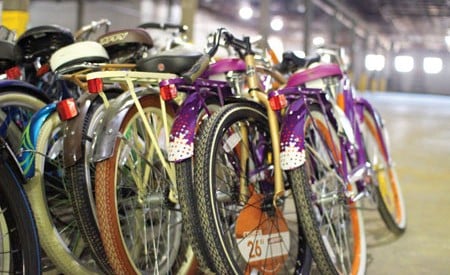Have you ever wondered what happened to that dinky bicycle you set on your front lawn with a FREE sign taped to it? Chances are, someone from the nonprofit organization Bikes for the World picked it up and shipped it off to Ghana. Seriously.
Bikes for the World (BfW) was started in 1995 by a group of internationally-conscious, bike-savvy volunteers. Keith Oberg, executive director and board member of BfW, has been with the organization since its founding. Initially the vice-president and coordinator for BfW’s foundation, Pedals for Progress, Oberg says his 13-year-long career in international development inspired him to think bigger. In 2005, Pedals for Progress became Bikes for the World.
“I saw the value of bicycles for low-income families,” Oberg says. “In many places, street vendors who have fruit stands out of the back of their tricycles don’t actually own that bike. They have to rent them, which decreases their daily earnings and standard of living.”
Oberg says the need for an international bike charity program became truly apparent when he learned of a carpenter in Ecuador who was considered the richest man in town because he owned a bike.
“That bike allowed him to carry his tools and reach areas that were even a couple hours’ ride away,” he says. “Having a bicycle gave people control over their lives. Instead of saying, ‘I’ll be there ‘mañana,’ they could now say, ‘I’ll be there at 4PM.’ That’s incredibly empowering.”
Located in Arlington, Va., with a total of 12 full-time staff and board members, BfW sent over 13,500 bikes to Kenya, Panama, Uganda, Costa Rica, and the Philippines last year. In October, they sent their 70,000th bike to Costa Rica. From there, the number of volunteers and incoming bikes has been continually increasing.
“Yes, these bikes benefit people overseas,” says Oberg, “but the process of collecting the bikes is a very educational, tangible learning opportunity on the domestic front. The volunteers learn about bikes on various levels. They gain an appreciation for and a familiarity with bicycles which makes them more likely to ride bikes here.”
In May of 2012, BfW partnered with national retailer Dick’s Sporting Goods, which resulted in the donation of 4,200 bikes. In exchange for donating a used bike, Dick’s offered customers a discount on the purchase of a new ride.
“We’re a nonprofit, but we’re run like any business,” Oberg says. “We don’t want junk bikes, and there’s an attitude among some countries that we’re shipping junk. We make sure each bike we send is appropriate for the market and environment, and we send the bikes with spare parts.”
Oberg says one of the biggest challenges BfW, and any international charity organization, had to overcome was the shipping and safe arrival of the bikes.
“If the receiving organization is not somehow financially invested in the bikes, the shipment is oftentimes abandoned at the port,” says Oberg.
Oberg and the BfW Board of Directors work hard to avoid any such losses, establishing partnerships with legitimate companies and NGOs like Goodwill, Bikes for the Philippines, Wheels of Africa, the Village Bicycle Project, and Bicycling Empowerment Network in Namibia and South Africa.
Providing quality used bikes and parts is not BfW’s only goal however. Education is one of its primary values.
“There’s a high dropout rate in many rural communities because it’s so hard to get to the closest school,” Oberg says. “Often the regional high school is 10 miles down the road and there’s usually no public transportation available. For each year a child stays in school, there is a corresponding economic impact.”
Oberg says the program in the Philippines specifically provides students with a bicycle to use throughout their schooling. If they successfully graduate, they become the owners of their bikes. Otherwise, they are forced to return their bikes, thereby giving up any sense of independence and responsibility.
“A bicycle can get someone someplace—like from poverty to self-sufficiency,” as Bike for the World’s mission states.
For community organizations or individuals looking for a service project opportunity, Oberg says this is by far one of the most rewarding experiences available. BfW works with over 900 volunteers a year, and it is largely the efforts of these selfless souls that get the 40-foot shipping containers packed to the brim with approximately 500 bikes each.
“We work with everyone from Rotary and Kiwanis clubs to scout troops and churches,” Oberg says. “The community groups host the collection, staff it, break down the bikes, and we pick them up to take to storage.”








